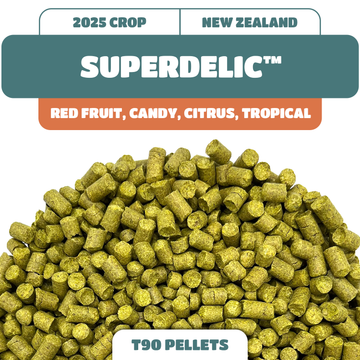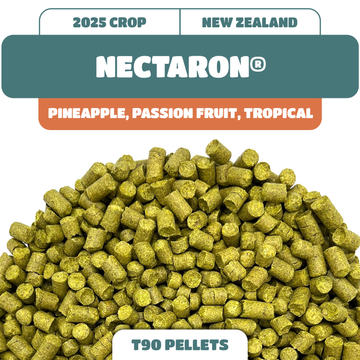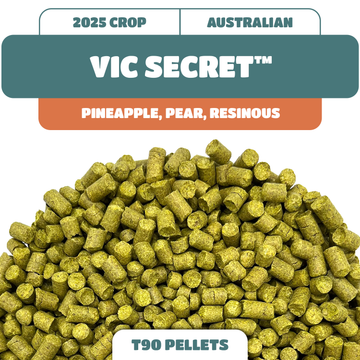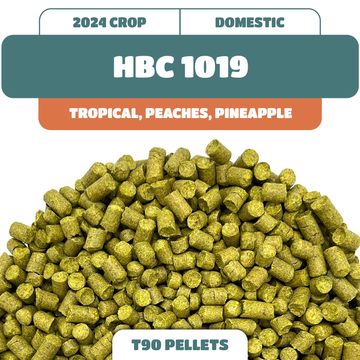El Dorado Hop Profile
There are many things that spring to mind when you hear El Dorado. In another time it's a golden king, a jeweled city which was paved with gold, then a entire empire, rich beyond belief. Many have searched for it. Edger Alan Poe penned a poem about a knight in search of the golden one. Yet, all of that hunting never turned the myth of El Dorado into a reality. But today, we’ve got our own El Dorado in the form of a hop variety.
Something like the myth of El Dorado, there are a few mysteries surrounding the El Dorado hop.
CLS Farms in the Moxee Valley, Washington created El Dorado. There are many sources that say it was developed in 2008 and eventually released in 2010. Did it really only take two years to develop? Now that would be truly legendary by hop breeding standards. Generally, it takes ten to fourteen years for a new hop to be ready for commercial use. So, what’s the real answer? For that, we will just have to wait for additional breeding information from CLS Farms to know any of the specifics.
Does this hop bare any resemblance to the myth of the golden city? There are a few similarities: it is mysterious and for a lot of brewers, it's a king among hops. But, what about the gold? You just have to look inside. Like the streets of the fabled city ran, lupulin within the cone has a deep golden shine.
Brew El Dorado Hops
Unfortunately for the home brewer and gardener, the El Dorado hop variety is owned by CLS Farms and rhizomes are not available.
If you plan on growing hops in your backyard, it would be helpful to talk to other hop farmers in your area. Maybe visit the staff at your local home brew supply store. They will be able guide you on which varieties grow well in your area It just won’t be El Dorado at this time.
El Dorado Acid Composition Breakdown
- Alpha Acid: 13 – 17%
- Beta Acid: 7 – 8%
- Co-Humulone: 28 – 33%
- Oil Composition Breakdown
- Total Oils: 2.5 – 3.3 mL/100g
- Myrcene Oil: 55 – 60% (of total)
- Humulene Oil: 10 – 15% (of total)
- Caryophyllene Oil: 6 – 8% (of total)
- Franesene Oil: 0.1% (of total)
- B-Pinene Oil: 0.56% (of total)
- Linalool Oil: 0.70% (of total)
- Geraniol Oil: 0.02% (of total)
El Dorado General Characteristics:
- Origin — CBS Farms (Moxee Valley, Washington)
- Growth Rate — Vigorous
- Yield — 2300 – 2500 lbs/acre
- Maturity — Early to Mid Season
- Storage — Good; Retains 60% to 70% alpha acid after 6 months storage at 68°F
Sensory & Aroma Description:
El Dorado has bold, intense aromas of stone fruit, especially cherry and apricot. Other fruit aromas include a zest of citrus, pear, and watermelon. On the nose, it imbues aromas that are almost reminiscent of candy, like Lifesavers or maybe Starburst.
Spicy notes are subdued, playing second fiddle to the fruit, but may have a background note of grass, wood, or mint.
Availability:
It’s very likely your hops resource carries the El Dorado variety. Michigan Hop Alliance does stock it in bulk. However, it’s always a good idea to give smaller suppliers a call first to check if it's stock. If they do not have it in, you can typically put in a request, but there is no need to worry about not being able to get your hands on it.
Due to El Dorado’s extreme popularity, it is readily available through many brewing online retailers. You will have the ability to buy the hop in many forms, including pellets, whole cones and hop hash. Some online retailers even offer El Dorado as steam distilled extract.
Use:
El Dorado is a dual-purpose hop, which means it can be used for bittering, flavor/aroma, and dry-hopping.
When bittering with El Dorado you should anticipate a firm, yet subtly balancing bitterness. It will not overwhelm, and it has been described as a rind-like drying bitterness. With its subtle bitterness, it seems particularly suited for use in Lagers, Blondes, even cream ales; however, its alpha-acid is considerable enough to play a single-hopped tune in something like an American IPA that is geared more toward flavors than bracing bitterness.
Recommendation: Use later in the boil, where less of its high Mercyene and Cohumuline content gets boiled away, it produces fruity flavors and aromas that run the spectrum of apricot, peach, and cherry; along with a pithy hit of citrus and some grassy undertones. This is a good hop to pair with other fruit-centric hops or leave to do the lion share of the flavor and aroma work, and pair it with a hop that has a much bolder bitterness.
Dry-hopping with El Dorado will no doubt give you an increase in fruity aromas turning them candied and intense. You can substitute with/for Galena and Simcoe hops.
Beer Styles Using El Dorado Hops:
- Blondes
- Lagers
- American Pales, IPA / DIPA
- Cream Ale & California Common
- Red & Amber Ales
- American Wheat
- American Wild Ales













